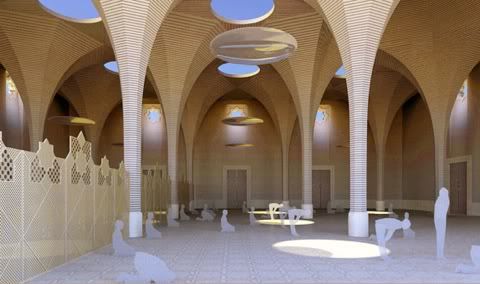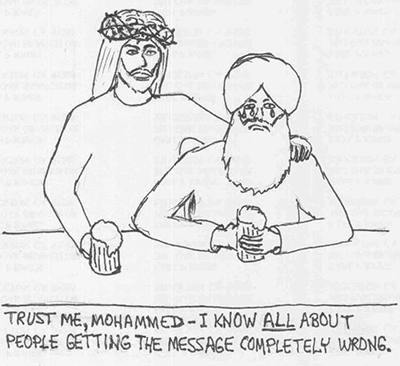 Everybody Draw Mohammed Day was going through my mind today when I rang Cambridge City Council to ask how permission for the proposed mosque on the city's Mill Road was progressing. I must admit I expected to learn nothing, but a very polite and helpful chap informed me that, although the land, the former Robert Sayle's site, had been acquired, no planning proposal had been submitted and one was not expected in the immediate future.
Everybody Draw Mohammed Day was going through my mind today when I rang Cambridge City Council to ask how permission for the proposed mosque on the city's Mill Road was progressing. I must admit I expected to learn nothing, but a very polite and helpful chap informed me that, although the land, the former Robert Sayle's site, had been acquired, no planning proposal had been submitted and one was not expected in the immediate future.The site was acquired in 2008 by the Cambridge Muslim Welfare Society and Mulsim Academic Trust; but a police investigation of an arson attack later in the year, which resulted in their demolition, is presumably hampering planning applications.
 Freedom of worship is an essential human right, so if the Muslim community in Cambridge is poorly housed in the Abu Bakr Jamia Mosque off Mill Road, then I hope they get permission for their mosque.
Freedom of worship is an essential human right, so if the Muslim community in Cambridge is poorly housed in the Abu Bakr Jamia Mosque off Mill Road, then I hope they get permission for their mosque.I also hope that any planning process is not a set-up like the Mill Road Tesco process, which was hijacked by well-heeled sandalistas objecting on ideological grounds in the knowledge that they have the money to patronise the independent shops.
So, in the event of there being a planning process that is open to the public, I have one issue that I hope will be debated in the open:
Given that paragraph 49 of Government planning advice PPG13 discourages adequate provision of parking spaces in order to promote sustainable transport choices, how will Councillors and planning officers treat proposals for parking spaces in the plans? If they apply the proposals consistently by refusing an application with adequate parking, how will they respond to claims that not everybody without private transport will be able to make it to worship, depending on where in Cambridgeshire they're coming from? (The Cambridgeshire Roman Catholic community has experienced this, with changes in Sunday bus timetables leaving residents in some villages unable to attend Sunday Mass.)
I am glad that mosque leaders have said that the mosque will have no minaret or call to prayer loudspeaker; speaking of members of Cambridge's 4000-strong Muslim community trying to cram into a space meant for 500 then "spilling out into the street", trustee Mohammed Mahmood says "We don't want to be a nuisance to neighbours anymore".
The reason I thought about Everybody Draw Mohammed Day when I was making my phone call was that I was reflecting how censorship on ideological grounds nurtures but disfigures that which it would suppress: it would have caused much less of a splash had Facebook not pulled the page that founded it. I was going to do a post for the day, but found myself unable to because any blog I would have linked to contained pictures I will not reproduce on a blog accessed by a lot of schools. But anyway, being given the information I wanted straight away was an unexpected and very pleasant surprise.
We see the worst of Islam all too often on the media. I hope the coming negotiations will show us its best out in the open.
And in a spirit of conciliation here, unlinked, is a cartoon by California's Earl Jones that I hope will speak to Muslims, Christians and beyond.












You mean everyone can be misunderstood equally? Isn't that a bit, pardon the expression, liberal??? Nice post.
ReplyDeleteThanks, RisA - good point!
ReplyDeleteI rather object to being described as a "well-heeled sandalista" because I objected to yet another Tesco on my doorstep. Is intelligent objection to the increasing homogeneity of our High Streets to be sneered at by supercilious reactionaries, who clearly have paid little attention to the campaigns against Tesco et al throughout the leafier lanes of "middle England" (admittedly affluent, but probably in sensible shoes rather than sandals). I would also welcome the opportunity to object to the increasing number of downmarket eating outlets on my doorstep (and not because I can afford to patronise more expensive places, which I can't)but planning law prevents this. Perhaps with the current goivernment's commitment to greater local say in planning decisions, we shall see an increasing flurry of such campaigns. I would also like the chance to somehow prevent Romsey becoming the exclusive province of the "well-heeled" but the stupidity of house prices, spiralling rents and the effect of the Right to Buy on public sector housing means this is very unlikely.
ReplyDeleteThanks for your comment, David. I have one question: why is there not nearly as much of a fuss about Waitrose's application for an alcohol licence in Fitzroy Street, which is part of the same cumulative impact zone as Mill Road? The campaign against Mill Road Tesco was clearly class-based and, as a blue-collar Tory, I can't afford to buy from the independent shops that are apparently so ideologically beautiful.
ReplyDeleteFreedom of worship is NOT an essential human right.
ReplyDeleteI think you made it up!
For reference:
* The right to life (Article 2 of the European Convention on Human Rights)
* The right not to be subjected to torture, inhuman or degrading treatment or punishment (Article 3)
* The right to be free from slavery and forced labour (Article 4)
* The right to liberty (Article 5)
* The right to a fair and public trial or hearing (Article 6)
* The right not to be subject to arbitrary or retrospective criminal penalties (Article 7)
* The right to respect for private and family life, home and correspondence (Article 8)
* The right to freedom of thought, conscience and religion (Article 9)
* The right to freedom of expression and to receive and impart information (Article 10)
* The right to assembly and to associate with others, including in organisations such as trade unions (Article 11)
* The right to marry and start a family (Article 12)
* The right not to be discriminated against (Article 14)
* The right to peaceful enjoyment of possessions and property (Protocol 1, Article 1)
* The right to education, including respect for the religious and philosophical convictions of parents (Protocol 1, Article 2)
* The requirement to hold free and fair elections (Protocol 1, Article 3)
* Abolition of the death penalty (Protocol 6, Article 1)
* There is no entitlement to use the rights guaranteed by the act to abolish, undermine or limit any other right (Article 17)